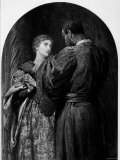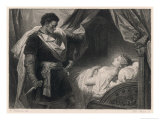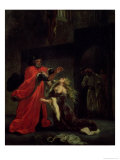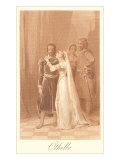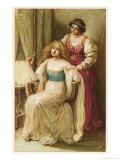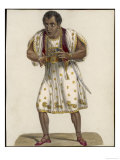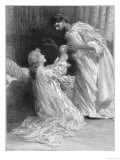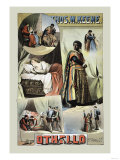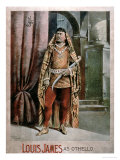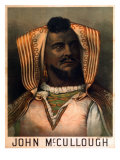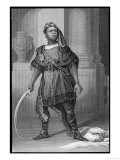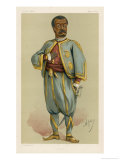|
|
“Othello: The Moor of Venice” Educational Posters & Prints
|
literature > William Shakespeare > OTHELLO < social studies
|
|

Othello
“The Moor is of a free and open nature that thinks men honest.”
|
Othello: The Moor of Venice is a tragedy, written c. 1603 by William Shakespeare.
The title character, Othello, is an African prince living in Venice as an ambassador from the Moors. He and Desdemona, the daughter of a Venetian senator, fall in love and elope; eventually Othello is deployed to Cyprus. When Othello's servant Iago tricks him into believing that Desdemona is having an affair with one of his soldiers, Michael Cassio, Othello kills her out of jealousy, only to realize that she was faithful, at which point he commits suicide.
There are several candidates as models for the character of Othello: the diplomat Leo Africanus who wrote a description of North Africa, and Abd el-Ouahed ben Messaoud, an ambassador to Elizabeth I from Morocco. The story has roots in “Un Capitano Moro” by Giovanni Battista Giraldi (Cinthio), and The Three Apples from One Thousand One Nights.
FYI ~ Composer Edward Elgar titled his “Pomp and Circustances Marches” from Act III, Scene III, of Othello. “O farewell, / Farewell the neighing steed, and the shrill trump, / The spirit-stirring drum, th' ear-piercing fife; / The royal banner, and all quality, / Pride, pomp, and circumstance of glorious war! / And O you mortal engines, whose rude throats / Th' immortal Jove's dread clamors counterfeit, / Farewell! Othello's occupation's gone.” (During the Renaissance “pomp and circumstance” were considered the inherent, and positive, duties of the exalted classes - so as a graduate, marching down the aisle, what is expected of you now?)
|
|
|
|

Othello: Good Name,
Art Print
|
Good name in man and woman, dear my lord,
Is the immediate jewel of their souls.
Who steals my purse steals trash; 'tis something, nothing;
'Twas mine, 'tis his, and has been slave to thousands;
But he that filches from me my good name
Robs me of that which not enriches him,
And makes me poor indeed.
Act 3, Scene 3 |
|
|
|
|
|
|
|
|
Illustrations of Othello and Desdemona,
Scene from William Shakespeare's Play, “Othello”. |
|
|
|
|
|
|
|
|
|
|
|
|
|
|
|
|
|
|
|
|
|
|
|
|

Othello: Good Name,
Art Print
|
Good name in man and woman, dear my lord,
Is the immediate jewel of their souls.
Who steals my purse steals trash; 'tis something, nothing;
'Twas mine, 'tis his, and has been slave to thousands;
But he that filches from me my good name
Robs me of that which not enriches him,
And makes me poor indeed.
Act 3, Scene 3 |
|
|
|
|
|
|
|
|
|
|
|
|
|
|
|
|
|
|
Ira Frederick Aldridge was an actor of African American who made his career mainly on the London stage, and earned high reviews for his Othello.
|
|
|
|
William Shakespeare
b. 4-23-1564
d. 5-3-1616
Good name in man and woman, dear my lord,
Is the immediate jewel of their souls:
Who steals my purse steals trash; 'tis something, nothing;
'Twas mine, 'tis his, and has been slave to thousands;
But he that filches from me my good name
Robs me of that which not enriches him
And makes me poor indeed.
— Othello
• more Shakespeare posters
• Poetry Forms Posters
|
|
|
|
I have searched the web for visual, text, and manipulative curriculum support materials - teaching posters, art prints, maps, charts, calendars, books and educational toys featuring famous people, places and events - to help teachers optimize their valuable time and budget.
Browsing the subject areas at NetPosterWorks.com is a learning experience where educators can plan context rich environments while comparing prices, special discounts, framing options and shipping from educational resources.
Thank you for starting your search for inspirational, motivational, and educational posters and learning materials at NetPosterWorks.com. If you need help please contact us.
|
|
|












